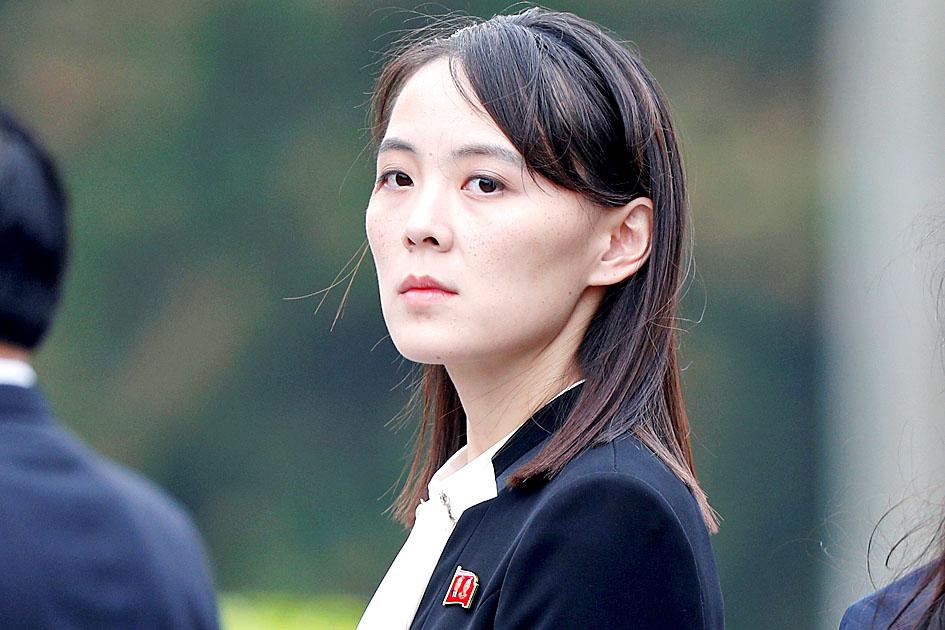North Korea yesterday accused US President Joe Biden of pursuing a hostile policy, dismissing “spurious” US diplomacy and warning of a response.
Biden had said on Wednesday that his administration would deal with the threat posed by Pyongyang’s nuclear program “through diplomacy as well as stern deterrence.”
The White House on Friday said that the president was open to negotiations with North Korea on denuclearization following the completion of a policy review, but Pyongyang said Biden had made a “big blunder.”

Photo: Reuters
“His statement clearly reflects his intent to keep enforcing the hostile policy toward the DPRK [Democratic People’s Republic of Korea] as it had been done by the US for over half a century,” Kwon Jung-gun, a North Korean Ministry of Foreign Affairs official, said in a statement released by the Korean Central News Agency (KCNA).
“The US-claimed ‘diplomacy’ is a spurious signboard for covering up its hostile acts, and ‘deterrence’ touted by it is just a means for posing nuclear threats to the DPRK,” Kwon said. “Now that what the keynote of the US new DPRK policy has become clear [sic], we will be compelled to press for corresponding measures.”
The White House on Friday said that its goal remains “the complete denuclearization of the Korean Peninsula.”
White House Press Secretary Jen Psaki said that Washington would not “focus on achieving a grand bargain,” apparently referring to the kind of deal that former US president Donald Trump suggested was possible when he met with North Korean leader Kim Jong-un.
Neither would the White House follow the more standoffish approach espoused by former US president Barack Obama, she added.
In a separate statement through the KCNA yesterday, North Korea also accused the US of insulting its leadership and COVID-19 measures, referring to a US Department of State news release issued on Wednesday.
Department spokesman Ned Price had issued a statement criticizing North Korea’s human rights abuses and draconian COVID-19 curbs, describing it as “one of the most repressive and totalitarian states in the world.”
“The ‘human rights issue’ touted by the US is a political trick designed to destroy the ideology and social system in the DPRK,” the North Korean foreign ministry said.
In a third statement issued yesterday, Kim’s powerful sister, Kim Yo-jong, lashed out at South Korea over a recent anti-Pyongyang leaflet campaign by a defector group.
Activist groups have long sent flyers critical of the North Korean leadership across the demilitarized zone (DMZ) dividing the peninsula.
The leaflets have infuriated Pyongyang, which last year demanded that Seoul take action and blew up an inter-Korean liaison office on its side of the border.
The South Korean parliament rapidly passed a law criminalizing the leaflet campaigns in December last year, but a defector group said it flew 500,000 leaflets near the DMZ last week in defiance of the law.
Kim Yo-jong blamed South Korean authorities for not stopping them.
“We regard the maneuvers committed by the human wastes in the south as a serious provocation against our state and will look into corresponding action,” she said.

NATIONAL SECURITY THREAT: An official said that Guan Guan’s comments had gone beyond the threshold of free speech, as she advocated for the destruction of the ROC China-born media influencer Guan Guan’s (關關) residency permit has been revoked for repeatedly posting pro-China content that threatens national security, the National Immigration Agency said yesterday. Guan Guan has said many controversial things in her videos posted to Douyin (抖音), including “the red flag will soon be painted all over Taiwan” and “Taiwan is an inseparable part of China,” while expressing hope for expedited “reunification.” The agency received multiple reports alleging that Guan Guan had advocated for armed reunification last year. After investigating, the agency last month issued a notice requiring her to appear and account for her actions. Guan Guan appeared as required,

A strong cold air mass is expected to arrive tonight, bringing a change in weather and a drop in temperature, the Central Weather Administration (CWA) said. The coldest time would be early on Thursday morning, with temperatures in some areas dipping as low as 8°C, it said. Daytime highs yesterday were 22°C to 24°C in northern and eastern Taiwan, and about 25°C to 28°C in the central and southern regions, it said. However, nighttime lows would dip to about 15°C to 16°C in central and northern Taiwan as well as the northeast, and 17°C to 19°C elsewhere, it said. Tropical Storm Nokaen, currently

‘NATO-PLUS’: ‘Our strategic partners in the Indo-Pacific are facing increasing aggression by the Chinese Communist Party,’ US Representative Rob Wittman said The US House of Representatives on Monday released its version of the Consolidated Appropriations Act, which includes US$1.15 billion to support security cooperation with Taiwan. The omnibus act, covering US$1.2 trillion of spending, allocates US$1 billion for the Taiwan Security Cooperation Initiative, as well as US$150 million for the replacement of defense articles and reimbursement of defense services provided to Taiwan. The fund allocations were based on the US National Defense Authorization Act for fiscal 2026 that was passed by the US Congress last month and authorized up to US$1 billion to the US Defense Security Cooperation Agency in support of the

PAPERS, PLEASE: The gang exploited the high value of the passports, selling them at inflated prices to Chinese buyers, who would treat them as ‘invisibility cloaks’ The Yilan District Court has handed four members of a syndicate prison terms ranging from one year and two months to two years and two months for their involvement in a scheme to purchase Taiwanese passports and resell them abroad at a massive markup. A Chinese human smuggling syndicate purchased Taiwanese passports through local criminal networks, exploiting the passports’ visa-free travel privileges to turn a profit of more than 20 times the original price, the court said. Such criminal organizations enable people to impersonate Taiwanese when entering and exiting Taiwan and other countries, undermining social order and the credibility of the nation’s